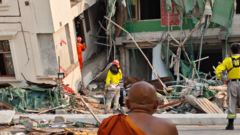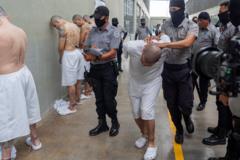The move signals a tightening grip on immigration and challenges South Sudan’s cooperation.
Trump Administration Takes Hard Stance on South Sudanese Visas Amid Deportation Controversy

Trump Administration Takes Hard Stance on South Sudanese Visas Amid Deportation Controversy
Secretary of State Marco Rubio revokes South Sudanese visas, citing government delays in accepting deportees.
April 5, 2025, 8:10 p.m. ET—In a significant shift in immigration policy, Secretary of State Marco Rubio announced on Saturday that all visas held by South Sudanese passport holders will be revoked. This decision was made in response to the transitional government of South Sudan's failure to promptly accept its citizens being deported from the United States.
Rubio explained in a social media message that he would also restrict any further visa issuances for South Sudanese individuals until the nation fully cooperates with repatriation efforts. In a statement from the State Department, he emphasized the need for South Sudan to effectively manage the returns of its deported citizens.
This action mirrors a recent declaration by President Trump who, earlier this year, threatened Colombian officials with similar measures based on their hesitance to facilitate military flights returning deported nationals. Quick action from Colombia followed Trump's threats, suggesting a pattern of aggressive diplomacy in dealing with countries that refuse deportation agreements.
The broader implications of Rubio's sweeping decision augment the Trump administration's ongoing efforts to expedite the deportation of foreign nationals, as promised during his campaign. Legal challenges against these deportation efforts have emerged, with some judges issuing temporary restraining orders to safeguard affected individuals.
Critics, including Lucas Guttentag, a former Justice Department official, have condemned this policy as discriminatory, alleging that it unfairly punishes innocent visa holders based solely on their nationality, rather than pursuing genuine diplomatic solutions. As of late Saturday, South Sudanese officials had not responded to inquiries regarding the visa revocation.
Rubio explained in a social media message that he would also restrict any further visa issuances for South Sudanese individuals until the nation fully cooperates with repatriation efforts. In a statement from the State Department, he emphasized the need for South Sudan to effectively manage the returns of its deported citizens.
This action mirrors a recent declaration by President Trump who, earlier this year, threatened Colombian officials with similar measures based on their hesitance to facilitate military flights returning deported nationals. Quick action from Colombia followed Trump's threats, suggesting a pattern of aggressive diplomacy in dealing with countries that refuse deportation agreements.
The broader implications of Rubio's sweeping decision augment the Trump administration's ongoing efforts to expedite the deportation of foreign nationals, as promised during his campaign. Legal challenges against these deportation efforts have emerged, with some judges issuing temporary restraining orders to safeguard affected individuals.
Critics, including Lucas Guttentag, a former Justice Department official, have condemned this policy as discriminatory, alleging that it unfairly punishes innocent visa holders based solely on their nationality, rather than pursuing genuine diplomatic solutions. As of late Saturday, South Sudanese officials had not responded to inquiries regarding the visa revocation.




















